Andean-U.S.Trade Agreement Stalls Over Drug Data Exclusivity

According to Bridges Weekly Trade News Digest on November 30, 2005, disagreements over farm trade and intellectual property rights (IPRs) prevented the US and Colombia, Peru and Ecuador from striking a deal during nine days of talks over the proposed Andean-US Free Trade Agreement (FTA) at the end of November 2005:
Martin Vaughan also reported that the acceptance of the five-year data exclusivity for drugs was tied to US acceptance of biodiversity provisions. "It was also not clear how far the US will go in accepting provisions on traditional knowledge or biodiversity," he wrote for Intellectual Property Watch on December 2, 2005. "A spokeswoman for the Office of the US Trade Representative said officials are not commenting on the specifics of negotiations because the talks are at a sensitive stage."The length of the pharmaceutical "data exclusivity" period has been one of
the key sticking points in the talks. This refers to a protection period for the
clinical test data that brand name pharmaceutical companies submit to government
sanitary authorities when seeking the right to put a new drug on the market.
This could potentially delay the entry of generic versions into the market,
since would-be generic manufacturers would have to either wait for the end of
the exclusivity period or run their own clinical tests in order to secure
marketing approval for their products.Peru and Colombia are said to have accepted the five-year period that the US was seeking. However, Peru is seeking the option of waiving this condition in the event of a national emergency. This issue went unresolved during its recent bilateral talks with the US. It is not clear whether Colombia is seeking a similar waiver.
Ecuador has been holding out for a shorter, three-year period for data protection, in addition to a national emergency waiver. It also has concerns with regard to the coverage and effects of patents. Ecuadorian trade negotiators insist that they are unwilling to accept hasty concessions simply in order to strike a deal. One suggested that it would block the negotiations indefinitely if Peru agreed to IP concessions
that it found unacceptable.Ecuador's comparatively wary approach to the negotiations have some trade analysts suggesting that Peru and possibly Colombia would abandon the joint discussions altogether in favour of separate bilateral agreements with the US.
The Andean official said Colombia and Peru have also moved in the direction of
the United States on another patent issue, the so-called “linkage” issue. The US
wants to make marketing approval of new drugs contingent on the existence of no
prior patent, and has sought to require countries’ health ministries to verify
that marketing approvals do not clear the way for infringing upon existing
patents. The official suggested that those obligations could be crafted in such
a way to require the applicant seeking marketing approval to submit
documentation showing that there was no existing patent, so that the burden will
not be placed on the health ministry.

0 Comments:
Post a Comment
<< Home
© 2004-2007 William F. Heinze